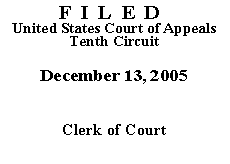

| JOSEPH J. GONZALES,
Plaintiff-Appellant, v. QWEST COMMUNICATIONS CORPORATION, Defendant-Appellee. |
|
Appellant Joseph J. Gonzales brought suit against his former employer, appellee Qwest Communications, Inc., alleging national origin discrimination and retaliation under Title VII of the Civil Rights Act of 1964, 42 U.S.C. 2000e-1 to 2000e-17 and under 42 U.S.C. 1981. Mr. Gonzales also alleged age discrimination under the Age Discrimination in Employment Act, 29 U.S.C. 621-34. The district court accepted the magistrate judge's recommendation and entered an order granting Qwest's motion for summary judgment.
Mr. Gonzales appeals, arguing: (1) the district court erred when it found that no genuine issue existed as to any fact material to Mr. Gonzales's claims and that Qwest was entitled to judgment as a matter of law, and (2) the district court erred when it refused to consider evidence that had not been presented to the magistrate judge before she made her recommendation.
As to Mr. Gonzales's first point, we affirm the judgment of the district court for the reasons stated in the district court's order filed September 20, 2004, and for the reasons stated in the magistrate judge's recommendation filed March 10, 2004, that was accepted by the district court. As to Mr. Gonzales's second point, we hold that the district court did not abuse its discretion in refusing to consider evidence not presented to the magistrate judge.
In his objections to the magistrate judge's recommendations, Mr. Gonzales presented "affidavits, excerpts from depositions, and other materials which were not presented to the magistrate judge." Aplt. App., Vol. II, at 546. Among other requests, Mr. Gonzales asked the district court to:
review evidence concerning Exhibit No. 4 in light of new evidence (some monthly e-mail reports not disclosed by defendant and discovered by plaintiff after his [response to defendant's summary judgment motion] was filed as well as additional deposition pages for [one of Mr. Gonzales's superiors] and [Mr.] Gonzales).
Aplt. App., Vol. II, at 442 (emphasis added). One of the "monthly e-mail reports" that was allegedly "new evidence" stated that at the time the e-mail was written a number of first-level managers, including Mr. Gonzales, had not submitted "their [performance] numbers in over two weeks." Aplt. App., Vol. II, at 519.
The district court refused to consider the evidence not presented to the magistrate judge, finding that Mr. Gonzales "made an insufficient showing that the additional material attached to the objections could not have been discovered, with due diligence, and presented to the magistrate judge" and that "the objections seem to continue a persistent pattern of careless preparation exhibited in plaintiff's response to the motion for summary judgment." Aplt. App., Vol. II, at 546-47. On appeal, Mr. Gonzales argues that, although "his former counsel was less than meticulous in her preparation of the material submitted to the court below on [his] behalf," Aplt. Opening Br. at 29, "the magistrate judge as well as the district court should have made a determination of the validity [of Mr. Gonzales's] former counsel's claim that she possessed evidence not previously disclosed by defendant prior to the filing of [Mr. Gonzales's] brief in opposition to . . . the defendant's motion for summary judgment," id. at 30.
When reviewing an objection to the magistrate judge's recommendation, "[t]he [district court] judge may . . . receive further evidence or recommit the matter to the magistrate judge with instructions." 28 U.S.C. 636(b)(1) (emphasis added). The decision whether to accept further evidence after the magistrate judge's recommendation is therefore within the district court judge's discretion. Doe v. Chao, 306 F.3d 170, 183 n.9 (4th Cir. 2002) (holding that the decision whether to receive additional evidence after a magistrate judge's recommendation of summary judgment has been presented "rests within the sound discretion of the district court"), aff'd, 540 U.S. 614 (2004); Drew v. Dep't of Corr., 297 F.3d 1278, 1289 n.4 (11th Cir. 2002) (holding that the district court has discretion to refuse to accept supplemental evidence not presented to the magistrate judge). Under the abuse-of-discretion standard, "a trial court's decision will not be disturbed unless the appellate court has a definite and firm conviction that the lower court made a clear error of judgment or exceeded the bounds of permissible choice in the circumstances." Nieto v. Kapoor, 268 F.3d 1208, 1221 (10th Cir. 2001) (further quotation omitted).
Here, Mr. Gonzales tellingly admits to this court that, due to his former counsel's delay in turning over his file to his appellate attorney, he does not know when he came into possession of these e-mails. Further, the uncertainty of whether or not these e-mails actually constituted "new" evidence is highlighted by the fact that the objections also sought to submit "additional pages" of Mr. Gonzales's deposition and the deposition of a superior as "new" evidence. Consequently, we cannot say that the district court judge abused his discretion when he held that Mr. Gonzales "made an insufficient showing that the additional material attached to the objections could not have been discovered, with due diligence, and presented to the magistrate judge," Aplt. App., Vol. II, at 546.
The judgment of the district court is AFFIRMED.
Entered for the Court
Circuit Judge
*. This order and judgment is not binding precedent, except under the doctrines of law of the case, res judicata, and collateral estoppel. The court generally disfavors the citation of orders and judgments; nevertheless, an order and judgment may be cited under the terms and conditions of 10th Cir. R. 36.3.